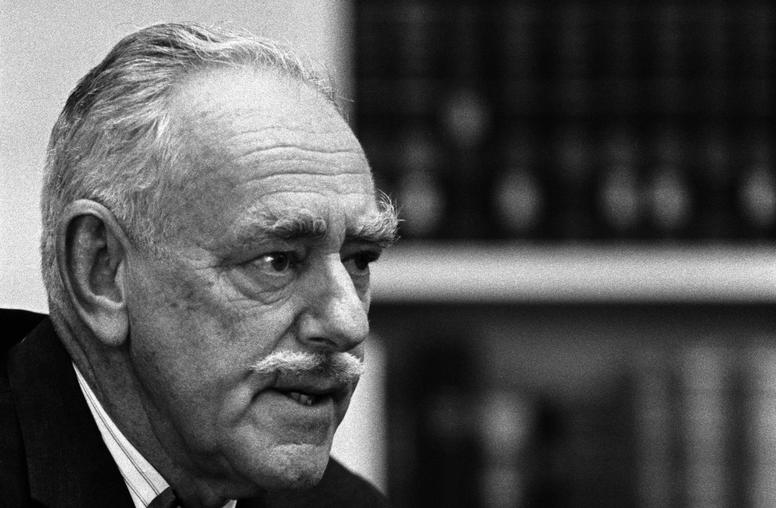China Has Peaked as a Challenger to U.S. Power, Former Secretary of State Shultz Says
While China continues to grow as an economy and a military and political power, its overall influence relative to the United States has passed its peak, former Secretary of State George Shultz said at the U.S. Institute of Peace January 30. As China’s population ages, fewer working-age people must support a larger aged and dependent populace. “I think China, in relation to the U.S., has already reached its peak,” Shultz said in offering the Institute’s annual Dean Acheson Lecture.
Shultz surveyed what he said are critical international issues facing the United States, pointing out Iran as a top concern, and urging the U.S. government to innovate aggressively on environmental policies by funding more energy-technology research and by taxing carbon emissions. In a discussion moderated by the Institute’s board chairman, former National Security Adviser Stephen Hadley, Shultz also laid out his approach to building a foreign-policy strategy.
Three decades after his tenure as one of the United States’ longest-serving secretaries of state, Shultz, 94, leads policy research—notably on energy and the economy—at Stanford University’s Hoover Institution. His prominence as a diplomat sometimes obscures Shultz’s training and career as an economist, and it was via economics that Shultz sketched China’s future.
“Beginning about 30 years ago, fertility in China dropped like a stone,” Shultz noted, and in recent years, China’s labor force has declined as a percentage of the total population. Thus China’s high economic growth rates of the past 30 years are “changing right now, almost like throwing a switch,” to a slower pace of expansion. And a steady transfer of villagers to city jobs and lives is removing them from the families and communities that historically have formed China’s social safety net. “So I think China has a big problem on its hands in managing that, [and] they’re very aware of that.”
China, perhaps even more than other governments, faces an additional challenge with the explosion of information and communications resources available to populations worldwide, Shultz said. People “can communicate, they can organize. And they do. Which means that any government, of whatever style, has to pay attention.”
The United States will have to sustain its opposition to Chinese efforts to build a dominant sphere of influence in Asia, an effort in which “China is actually getting a lot of pushback from all its neighbors,” Shultz said. “It isn’t working that well.”As a strategy challenge for the United States, Shultz singled out its effort to prevent Iran from establishing the capacity to build nuclear weapons. As the U.S. government and five other global powers resume negotiations with Iran this month, “Time is not on our side, it’s on their [the Iranians’] side, because sanctions are eroding,” Shultz said, and international political will to reinforce them is low. Since 2007, Shultz has co-led a campaign, the Nuclear Security Project, to seek a worldwide reduction and, ultimately, elimination of nuclear weapons.
The reality is you have to conduct a global diplomacy—the United States does. You have to be everywhere.
Building Strategies
Shultz, who was secretary of state in 1984, when the U.S. Institute of Peace was established, later served as a key supporter of the institute, co-leading a campaign to build its headquarters next to the State Department on the National Mall. His delivery of the Institute’s Acheson lecture came just after he joined fellow former secretaries of state Henry Kissinger and Madeleine Albright in testimony to the Senate Armed Services Committee.
At the Institute, Shultz responded to a question from Hadley by laying out his approach to establishing a foreign-policy strategy for the United States:
“The first thing you need to do is to describe the situation to yourself in realistic terms—no rose-colored glasses—what exactly is going on. And then you have to develop your strength and your ability to deal with the issues. Strength is important. It gives you options, and enables you to do things that you couldn’t do without it. It’s military strength but also economic strength and strength of purpose and of confidence in yourself.
“And on the basis of that, you have to develop a strategy, and develop what you think your agenda is. Don’t be thinking about what the other guy’s agenda is, think of what your agenda is, and then work from your agenda. And once you’re there, be ready to engage with people. But don’t forget your agenda. Don’t be too impressed with what it takes to get them to agree. Work from your agenda. That’s what you have to do. …
“The reality is you have to conduct a global diplomacy—the United States does. You have to be everywhere. And that’s why it’s so important to have this first-class Foreign Service that we have. Because they’re everywhere and they can work with the president, work with the secretary, work with the political appointees. They’re people who have spent their lives, spent their careers, understanding all these different places.”




